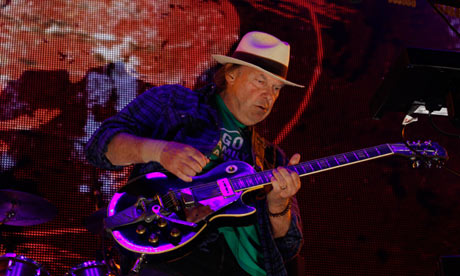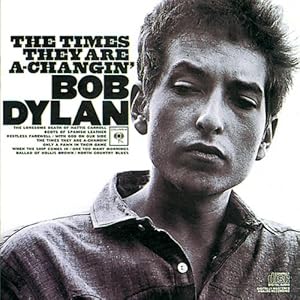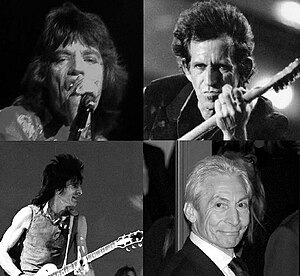by
Alexis Petridis, The Guardian:
http://www.guardian.co.uk
Neil
Young's marvellously idiosyncratic autobiography, Waging Heavy Peace,
rummages through his 50-year career - and offered its writer a relief
from music.
 |
| Neil Young with Crazy Horse during Farm Aid 2012 (Photo: Jacqueline Larma/AP) |
There are perhaps more relaxing preparations for interviewing
Neil Young about his autobiography than reading Neil Young's autobiography. It's not that
Waging Heavy Peace
isn't a good book. It is, albeit in a very Neil Young-ish way.
Over the
course of its 500 pages, Waging Heavy Peace is variously wildly
idiosyncratic, unpredictable, bafflingly digressive, wryly funny, deeply
moving, plain-speaking, still in thrall to the mysticism of the late
60s, painfully honest - "do not doubt me in my sincerity," counsels
Young at one point, "for it is this which has brought us to each other
now" - infuriatingly elusive and shot through with moments of rare
insight and beauty, which you might say makes it the perfect literary
counterpart to the 50-year career it describes, in a fairly roundabout
way.
Anyone hoping for a chronological hop through Young's triumphs - the astonishing run of albums that stretches from 1969's
Everybody Knows This is Nowhere to 1979's
Rust Never Sleeps,
the supergroup Crosby, Stills, Nash & Young, his early 90s
resurgence, borne by the alt-rock scene his music inspired - is going
to go home very disappointed indeed.
The main criticism of it is that it
has a tendency to ramble, but as fans at Crazy Horse's
recent show in New York's Central Park
would have told you - perhaps as their version of 1991's Love and Only
Love entered its 14th minute, with no sign of a conclusion in sight -
Young is an artist who has always reserved the right to ramble on a bit.
The
problem, at least for the prospective interviewer, and particularly
if the interviewer is a huge, hawkish Young fan, comes when you reach
the part where Young reveals his feelings about interviews.
"I hate
interviews," he offers, fairly unequivocally. Journalists, meanwhile,
are "jerks" and "dickheads". He is specifically referring to the
journalists from Associated Press present at the infamous mid-80s
interview when Young - he of the peace signs on his guitar strap and
the song about how he never knew a man could tell so many lies until he saw Richard Nixon -
appeared to voice support for Ronald Reagan.
But you somehow get the feeling it extends to the profession as
a whole. Still, at least the prospective interviewer can console himself
with the fact that he's not a blogger, by contrast with whom
journalists appear to be his favourite people in the world.
Still,
crackling down the line from his New York publisher's office, the
66-year-old sounds affable enough. If I never exactly get the impression
that talking to me is the highlight of his day, at least it's nothing
compared with some of the stories that circulate among quaking hacks who
have made his acquaintance over the years.
It might help that I
can't see him: Young's eyes apparently have a habit of fixing
journalists with a glare that causes them to wake in a cold sweat years
after their encounter. "Back in the beginning I was averse to doing
press because I'm not really comfortable with reading about myself," he
offers.
"It pisses me off that I can't just create art and have the art
stand on its own. I would say, hey, if it's a great album it's going to
sell … if it sucks, you know, no one's going to buy it. If it's
mediocre, some people will buy it, or it could be great and nobody will
get it. But it doesn't make any difference what you say about it."
Nevertheless,
he says, Waging Heavy Peace isn't intended as a rebuttal, a
misunderstood artist setting the facts straight: he professes not to
care about the shelfloads of
books that have already been written about him.
"There's nothing much I can do about it and it doesn't matter to me. I
find it of interest just to look at it and go, hey wow, that's something
else. What am I going to do with it? I don't know what to do with it."
In
fact, the book seems to have very prosaic reasons for existing.
"Writing is very convenient, has a low expense and is a great way to
pass the time," he tells the reader at one juncture, with admirable
candour. "I highly recommend it to any old rocker who is out of cash and
doesn't know what to do next."
Young needed the money, because he
appears to spend it as fast as he earns it. Not, it should be noted, on
rock star fripperies, but on vast, complex non-musical projects about
which he talks at length in Waging Heavy Peace: his
Lincvolt electric car, his inventions for model railways, and his
proprietary music system Pono, an iPod rival he says delivers perfect studio sound quality.
He
had the time because he broke his toe and was unable to play live: "My
manager had mentioned that Penguin was interested in me doing
my memoirs, but I hadn't thought much about it. But then when I broke my
toe I was just sitting there going, what am I gonna do now? I thought:
why don't I just do that book?"
To compound matters further, the author of
Homegrown and
Roll Another Number for the Road had
given up smoking marijuana and drinking alcohol on his doctor's advice: he suffered a brain aneurysm in 2005,
the same year his father died
after a long struggle with Alzheimer's.
He says that he had barely
written a song in 40 years without smoking weed: according to the book,
he had literally never performed with his most celebrated backing band
Crazy Horse straight. Waging Heavy Peace is underpinned by a struggle to
connect with his muse without the aid of a smoke. Given that he is
about to release his second new album this year, it's a struggle he
clearly overcame.
Arriving hot on the heels of Americana, which featured
Young and Crazy Horse singing the British national anthem, Psychedelic
Pill opens with a track that clocks in at nearly 28 minutes: clearly
Young's cranky eccentricity has survived sobriety intact.
In Waging
Heavy Peace, however, there are moments when Young openly wonders if
he'll ever complete another song. "How fucking loose do I have to be to
write a song?" he protests at one point.
To read further, go to:
http://www.guardian.co.uk/music/2012/oct/04/neil-young-autobiography-relief-music























